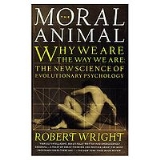
The Moral Animal
Encyclopedia
The Moral Animal is a 1994 book by Robert Wright
. The New York Times Book Review chose it as one of the 12 best books of 1994; it was a national bestseller and has been published in 12 languages.
The book explores many facets of our everyday life through the lens of evolutionary biology. Wright provides Darwinian explanations for human behavior and psychology, our social dynamics and structures, as well as our relationships with lovers, friends, and family.
The book borrows extensively from Charles Darwin
's better-known publications, including Origin of Species, but also from his chronicles and personal writings, illustrating behavioral principles with Darwin's own biographical examples.
Robert Wright (journalist)
Robert Wright is an American journalist, scholar, and prize-winning author of best-selling books about science, evolutionary psychology, history, religion, and game theory, including The Evolution of God, Nonzero: The Logic of Human Destiny, The Moral Animal, and Three Scientists and Their Gods:...
. The New York Times Book Review chose it as one of the 12 best books of 1994; it was a national bestseller and has been published in 12 languages.
The book explores many facets of our everyday life through the lens of evolutionary biology. Wright provides Darwinian explanations for human behavior and psychology, our social dynamics and structures, as well as our relationships with lovers, friends, and family.
The book borrows extensively from Charles Darwin
Charles Darwin
Charles Robert Darwin FRS was an English naturalist. He established that all species of life have descended over time from common ancestry, and proposed the scientific theory that this branching pattern of evolution resulted from a process that he called natural selection.He published his theory...
's better-known publications, including Origin of Species, but also from his chronicles and personal writings, illustrating behavioral principles with Darwin's own biographical examples.
See also
- Evolutionary Biology
- Evolutionary PsychologyEvolutionary psychologyEvolutionary psychology is an approach in the social and natural sciences that examines psychological traits such as memory, perception, and language from a modern evolutionary perspective. It seeks to identify which human psychological traits are evolved adaptations, that is, the functional...
- Evolutionary EthicsEvolutionary ethicsEvolutionary ethics could be either a form of descriptive ethics or normative ethics.Descriptive evolutionary ethics consists of biological approaches to ethics based on the role of evolution in shaping human psychology and behavior...
- MoralityMoralityMorality is the differentiation among intentions, decisions, and actions between those that are good and bad . A moral code is a system of morality and a moral is any one practice or teaching within a moral code...
- EthicsEthicsEthics, also known as moral philosophy, is a branch of philosophy that addresses questions about morality—that is, concepts such as good and evil, right and wrong, virtue and vice, justice and crime, etc.Major branches of ethics include:...
- Steven PinkerSteven PinkerSteven Arthur Pinker is a Canadian-American experimental psychologist, cognitive scientist, linguist and popular science author...
- Richard DawkinsRichard DawkinsClinton Richard Dawkins, FRS, FRSL , known as Richard Dawkins, is a British ethologist, evolutionary biologist and author...
- John Stuart MillJohn Stuart MillJohn Stuart Mill was a British philosopher, economist and civil servant. An influential contributor to social theory, political theory, and political economy, his conception of liberty justified the freedom of the individual in opposition to unlimited state control. He was a proponent of...
- Kin selectionKin selectionKin selection refers to apparent strategies in evolution that favor the reproductive success of an organism's relatives, even at a cost to the organism's own survival and reproduction. Charles Darwin was the first to discuss the concept of group/kin selection...
- Reciprocal altruismReciprocal altruismIn evolutionary biology, reciprocal altruism is a behaviour whereby an organism acts in a manner that temporarily reduces its fitness while increasing another organism's fitness, with the expectation that the other organism will act in a similar manner at a later time...
- The Naked ApeThe Naked ApeThe Naked Ape: A Zoologist's Study of the Human Animal is a 1967 book by zoologist and anthropologist Desmond Morris which looks at humans as a species and compares them to other animals...
Bibliographical information
- The Moral Animal: Why We Are the Way We Are: The New Science of Evolutionary Psychology. Vintage, 1995. ISBN 0-679-76399-6

